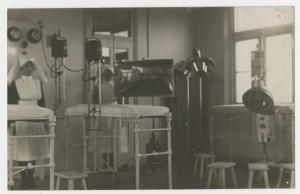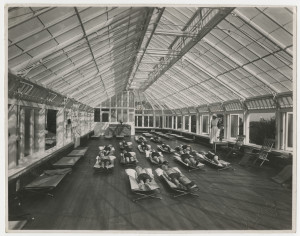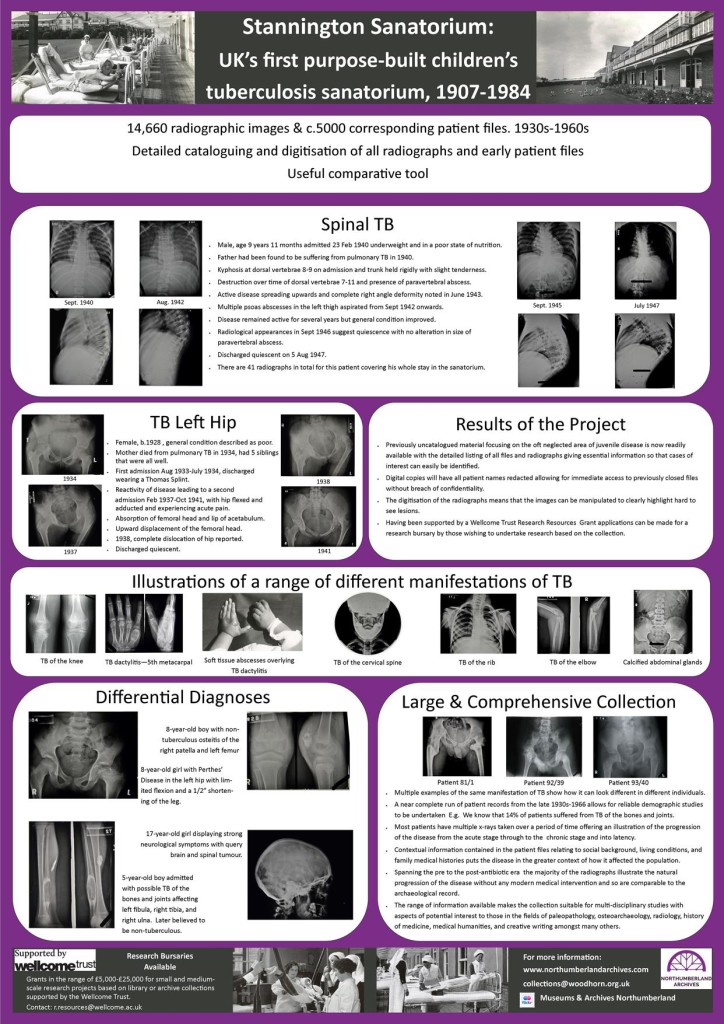AT BERWICK
Word was received about 9.30 o’clock last night that hostile airships were in the vicinity and had dropped bombs on Blyth. Precautionary methods were immediately taken. The electric light power was immediately switched off at the Urban Electric Works, and house-holders were ordered to extinguish all lights and the town was soon plunged into complete darkness. When the picture houses closed the people who had composed the audiences experienced considerable difficulty in reaching their homes owing to the intense darkness. Probably High Street was the most difficult to navigate and much good humored chaff could be heard as people tried to evade each other in the inky darkness. Fortunately, Berwick was not visited by the Zeppelin.

Wellcome Library, London. Copyrighted work available under Creative Commons Attribution only licence CC BY 4.0.
ST. ANDREW’S NURSING CLASS BERWICK
Results of Examination.
Social meeting and Presentation.
On Thursday evening the members of the Berwick St Andrew’s Nursing Class held a social meeting in the Long Room of the Corn Exchange.
The hall was gaily decorated with patriotic flags, flowers, and evergreens, and there was a touch of enthusiasm in all the preparations which at once engendered in the guests that feeling of welcome and sociability so essential in making such a gathering a success. Those present readily indulged in the games and dances, and, after an hour’s enjoyment in this way, were just in the right mood to receive the more formal part of the evening’s proceedings with a spirit which made all feel quite at ease.
The Mayor (Councillor Wilson) was accompanied to the chair by the Mayoress, the Sheriff, Dr and Mrs Maclagan, Miss Anthony, Matron of the Borough Hospital, and Miss Gradon, convenor of the Class Committee.
THE CLASS WORK.
On behalf of Miss Anthony, the Mayor read the following report on the origin and work of the class during the winter:-
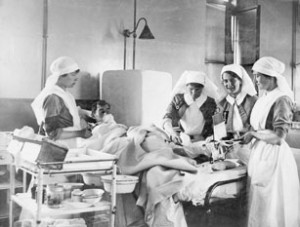
Very soon after war was declared, the Mayor asked me, would I be willing to teach bandaging, bed-making, etc., to about twenty ladies, so that they might be useful in the event of temporary hospitals being opened for wounded. I consented. This was the beginning of our ambulance class. Owing to unforeseen circumstances, the classes were not started until 14th September. At the first meeting twenty eight members were enrolled. The classes grew rapidly, chiefly owing to the enthusiasm of the members, and Miss Cockburn, who was appointed class secretary. At the end of September there were 42 names on the roll. It became necessary to seek a larger room. We secured the Parochial Hall, but owing to the arrival of wounded, we had to vacate it after three weeks. Captain Kimberley very kindly granted us the use of the Army Hall. Our next step was a decision to try for the “Home Nursing and Hygiene Certificate of St Andrew’s Ambulance Association.”…..
Thirty-seven sat for the examination, and all have obtained certificates…..
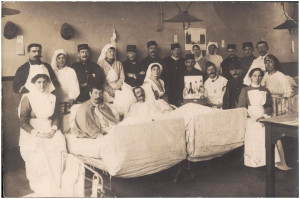
Postcard of World War One hospital ward, December 1914. Probably Le Havre region.
….In reviewing the report, the Mayor said he had no idea that the Nursing Class had assumed the size which it had, and he was glad to think that out of the little conversation which he had had with Miss Anthony prior to the commencement of the class so much good had accrued. He was delighted to know that success had attended their efforts, and that everyone who had gone up for examination had obtained certificate. He understood that they had worked very hard during the winter, and he had to congratulate both the Doctor and Miss Anthony on the results. There was, unfortunately, a great deal of fighting to be done at the front yet, and he was afraid that there would be many wounded soldiers in consequence. Berwick was ready and willing to do its share, and he believed that the services of some of the members of the class would be needed. Not only were they equipping themselves to be of use in this direction, but the knowledge gained would be of advantage to them in many ways. he trusted that all of them would maintain their connection with the class during the summer and next winter, would go up for the medallion of the Association……………………..


